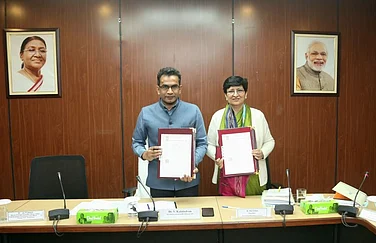Researchers at the National Institute of Technology (NIT), Rourkela have developed a cost-effective eco-friendly antibacterial agent using extracts from indigenous medicinal plants aiming to tackle the growing threat of antimicrobial resistance (AMR).
The innovation uses a green synthesis method to create zinc oxide nanoparticles, which are known for their potent antibacterial properties.
The study, published recently in the journal Surfaces and Interfaces, presents an eco-friendly alternative to chemically synthesised antimicrobials, using plant-based compounds that not only fight infection but also minimise environmental harm.
To synthesise the nanoparticles, the team employed aqueous extracts from Marigold petals, Mango leaves, and Eucalyptus leaves. These natural extracts acted as reducing agents to convert zinc salts into zinc oxide nanocrystals, simultaneously forming a phytochemical coating, referred to as a phyto-corona, around the nanoparticles.
“The green-synthesised zinc oxide nanoparticles with phyto-corona, as a sustainable and effective antimicrobial platform, offer a promising solution to combat antimicrobial resistance while leveraging the medicinal properties of surface-adsorbed plant-derived phytocompounds,” said Prof. Suman Jha, Associate Professor, Department of Life Science, NIT-Rourkela.
The research found that nanoparticles synthesised using marigold petal extract were nearly twice as effective at eliminating bacterial strains as compared to those produced via conventional chemical routes or plant extracts alone.
The enhanced efficacy is attributed to both the zinc oxide’s bactericidal properties and the bioactive compounds in the plant extracts — such as flavonoids, tannins, alkaloids, and phenolics — which collectively launch a “double attack” on bacterial cells.
The phyto-corona formed by these compounds not only stabilises the nanoparticles but also regulates the release of zinc ions, allowing for a sustained antimicrobial effect without the cytotoxicity often associated with synthetic alternatives.
The researchers said the use of locally available plant materials makes this method both cost-effective and scalable, supporting the development of indigenous, environmentally responsible solutions to drug resistance.
“Our vision is to develop scalable, affordable, and environmentally safe antimicrobial materials that can be integrated into healthcare, sanitation, and food preservation applications,” Prof. Jha added.
“By harnessing India’s rich biodiversity and indigenous plant resources, we aim to create self-reliant innovations that contribute meaningfully to global health and sustainability goals.”
The misuse and overuse of antibiotics remain major contributors to AMR, leading to the rise of ‘superbugs’—drug-resistant bacterial strains that pose significant public health risks.



























